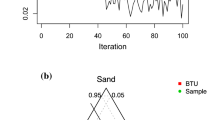Abstract
T. Kohonen and P. Somervuo have shown that self organizing maps (SOMs) are not restricted to numerical data. This paper proposes a symbolic measure that is used to implement a string self organizing map based on SOM algorithm. Such measure between two strings is a new string. Computation over strings is performed using a priority relationship among symbols, in this case, symbolic measure is able to generate new symbols. A complementary operation is defined in order to apply such measure to DNA strands. Finally, an algorithm is proposed in order to be able to implement a string self organizing map. This paper discusses the possibility of defining neural networks to rely on similarity instead of distance and shows examples of such networks for symbol strings.
Preview
Unable to display preview. Download preview PDF.
Similar content being viewed by others
References
Fischer, I., Zell, A.: String averages and self-organizing maps for strings. In: Proceeding of the ICSC Symposia on Neural Computation (NC 2000), Berlin, Germany, May 23-26, 2000, pp. 208–215 (2000)
Fischer, I.: Similarity-based neural networks for applications in computational molecular biology. In: Walter, C.D., Koç, Ç.K., Paar, C. (eds.) CHES 2003. LNCS, vol. 2779, pp. 208–218. Springer, Heidelberg (2003)
Blas, N.G., Santos, E., Díaz, M.A.: Symbolic Learning (Clustering) over DNA Strings. WSEAS Transactions on Information Science and Applications 4(3), 617–624 (2007)
Kohonen, T.: Self-Organization and Associative Memory. Springer, Heidelberg (1988)
Kohonen, T., Somervuo, P.: Self-Organizing Maps of Symbol Strings with Application to Speech Recognition (1997)
Kohonen, T., Somervuo, P.: Self-organizing maps of symbol strings. Neurocomputing 21, 19–30 (1998)
Levenshtein, L.I.: Binary codes capable of correcting deletions, insertions, and reversals. Soviet Physics–Doklady 10, 707–710 (1966)
Sánchez, M.C., Gómez, N., Mingo, L.F.: DNA Simulation of Genetic Algorithms: Fitness Function. International Journal on Information Theories and Applications 14(3), 211–217 (2007)
Author information
Authors and Affiliations
Editor information
Editors and Affiliations
Rights and permissions
Copyright information
© 2009 Springer-Verlag Berlin Heidelberg
About this paper
Cite this paper
de Mingo López, L.F., Blas, N.G., Díaz, M.A. (2009). A String Measure with Symbols Generation: String Self-Organizing Maps. In: Köppen, M., Kasabov, N., Coghill, G. (eds) Advances in Neuro-Information Processing. ICONIP 2008. Lecture Notes in Computer Science, vol 5507. Springer, Berlin, Heidelberg. https://doi.org/10.1007/978-3-642-03040-6_15
Download citation
DOI: https://doi.org/10.1007/978-3-642-03040-6_15
Publisher Name: Springer, Berlin, Heidelberg
Print ISBN: 978-3-642-03039-0
Online ISBN: 978-3-642-03040-6
eBook Packages: Computer ScienceComputer Science (R0)




